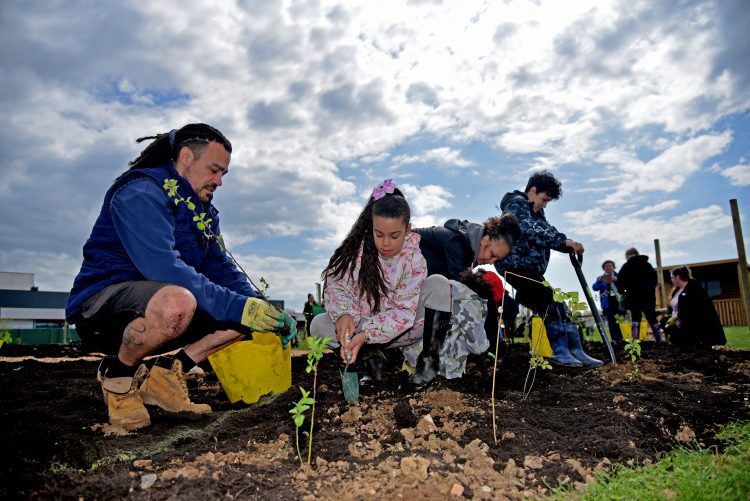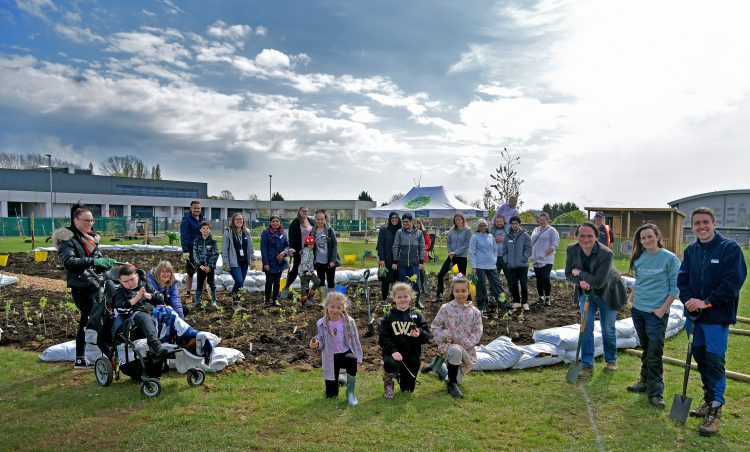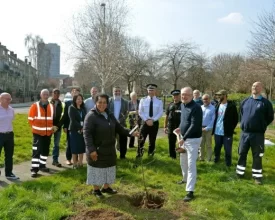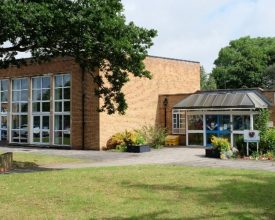Hundreds of local schoolchildren have helped to plant thousands of trees and create Tiny Forests at nine Leicester schools to celebrate the Birmingham 2022 Commonwealth Games.
Leicester City Council has teamed up with Severn Trent which is aiming to create 72 Tiny Forests in urban areas across the West Midlands, one for each of the nations and territories due to compete at Birmingham 2022. The ambitious planting programme is supported by environmental charity Earthwatch Europe, who are pioneering the Tiny Forest movement in the UK, and will help deliver a lasting legacy for the Games.

At each of the schools taking part in Leicester, pupils, staff and other volunteers have helped to plant 600 native trees in a plot of land about the size of a tennis court. The trees are planted densely together helping to maximise the nature benefits per square metre of land.
Located in the heart of urban communities, Tiny Forests aim to provide an oasis for plants, insects, birds and small mammals, and help more people to connect with nature in their local area.
The Tiny Forests will also play an important role in supporting the schools’ environmental education. Earthwatch Europe will provide training and resources to help the schools use the areas as inspiring outdoor classrooms.
The schools taking part are: Hope Hamilton CE Primary School, in Hamilton, Scraptoft Valley Primary School, in Nether Hall, New College, in New Parks, Whitehall Primary School, in Evington, Buswells Lodge Primary School, in Beaumont Leys, Ellesmere College, in Rowley Fields, St Mary’s Fields, in Rowley Fields, Nether Hall School and Beaumont Leys School.
In total, around 5,400 new trees have been planted in Leicester as part of the scheme.

Hope Hamilton Primary was one of the first schools to plant its new Tiny Forest. Headteacher Fiona Brooks said: ““We’re very proud that our school will be home to one of these nine new Tiny Forests and to be part of such an exciting scheme to mark the Commonwealth Games. The new trees will provide a nature oasis and rich learning environment that will be a hugely valuable resource for our school and the wider community. The children had a fantastic day working on the project and will remember their involvement for many years to come. We can’t wait to spend time in the beautiful new area and learning from it too.”
Jane Hauton, lead teacher for exploring the wider world and outdoor learning at Nether Hall School, said: “Nether Hall School are thrilled to be part of the Tiny Forest initiative. We are a special school catering for pupils with severe and profound learning difficulties and our students learn best through a multi-sensory approach. To have hands-on experience of exploring soil, compost, bark and mulch, the smells, textures and feeling of getting their hands dirty was rich and worthwhile. It was a great community and family orientated day where people aged between 5 and 55 joined together to create a legacy for the future. Thanks to everyone who made it possible.”
The Tiny Forest planting method used – called the Miyawaki method – involves planting native trees closely together in loose, nutrient-rich soil with no chemicals or fertilisers. This encourages accelerated forest development with low management and maintenance requirements after the first two years. It also helps with the rapid promotion of biodiversity.
Leicester was one of the first cities in the UK to take part in Earthwatch Europe’s Tiny Forest project when its first Tiny Forest was planted at Queensmead Primary Academy, in Braunstone, in March 2021.
Deputy city mayor Cllr Adam Clarke, who leads on environment and transport, said: “These nine Tiny Forests represent a huge boost to the city’s green infrastructure and bring both educational and environmental benefits. Many of the nations competing in the Commonwealth Games already face severe weather, ecological catastrophe and the wider disruption to society that follows, so it is very appropriate to mark the Games in this way.
“We know from our city-wide eco schools programme, that by bringing children closer to nature through high quality environmental education we are able to better prepare our city for the future and make a contribution to the climate emergency the whole planet faces.”








